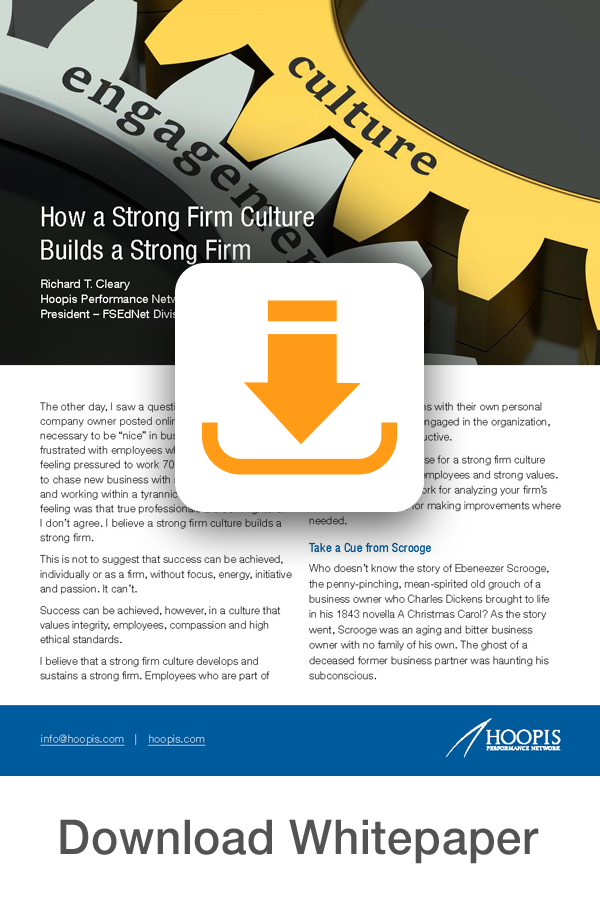How a Strong Firm Culture Builds a Strong Firm

The other day, I saw a question that a software company owner posted online. He asked if it’s necessary to be “nice” in business. He was frustrated with employees who’d complained about feeling pressured to work 70+ hour weeks, having to chase new business with a fierce competitiveness and working within a tyrannical internal culture. His feeling was that true professionals are born fighters. I don’t agree. I believe a strong firm culture builds a strong firm.
This is not to suggest that success can be achieved, individually or as a firm, without focus, energy, initiative and passion. It can’t.
Success can be achieved, however, in a culture that values integrity, employees, compassion and high ethical standards.
I believe that a strong firm culture develops and sustains a strong firm. Employees who are part of a strong culture that aligns with their own personal values tend to be more engaged in the organization, and therefore more productive.
This article makes the case for a strong firm culture that emphasizes happy employees and strong values. It also lays out a framework for analyzing your firm’s culture and strategies for making improvements where needed.
Take a Cue from Scrooge
Who doesn’t know the story of Ebeneezer Scrooge, the penny-pinching, mean-spirited old grouch of a business owner who Charles Dickens brought to life in his 1843 novella A Christmas Carol? As the story went, Scrooge was an aging and bitter business owner with no family of his own. The ghost of a deceased former business partner was haunting his subconscious.
Scrooge had one lone employee, Bob Cratchit, to handle the company’s books and collect from customers with the ferocious zeal of an IRS agent working for a bonus. A family man with a disabled son named Tim, Cratchit meekly asked Scrooge for Christmas Day off from work. It was a request for which he would pay dearly in the form of nonstop verbal and emotional abuse from Scrooge. Scrooge eventually granted Cratchit Christmas Day off without pay, only because of the Christmas custom. Besides, no businesses would be open for business on Christmas Day and, thus, no collections could be made.
Bob eventually persuaded the sad and lonely Scrooge to join the humble Cratchit family for Christmas dinner. Scrooge saw the positive spirit of the sick son, Tim, and the struggles of this loving family to make ends meet on the paltry wage Scrooge was paying. He heard the warnings of his ghost-partner, Jacob Marley, urging him to choose love over money.
Eventually, Scrooge rose to become a business owner who knew the value of values. He learned that a happy employee with a healthy work–life balance could help him build a successful firm.
Happy Firm, Happy Life
OK, I’m taking some liberties here with the old phrase, “happy wife, happy life.” A happy employee is absolutely necessary to building a strong firm.
Employees who come to work excited to fulfill the firm’s mission, effervescent with energy and ideas, and with a plan and the focus to execute the plan are typically successful employees.
Successful employees set goals. They meet and exceed deadlines. They contribute to the success of their teams and to the firm as a whole.
Compare these successful employees with the disgruntled employee who chronically shows up late or barely on time. The one who has a tired, disinterested look on his face. The one who takes too-long lunches, shuffles out early and complains to co-workers about colleagues or leadership.
Employees like that are a cancer to an entire organization. They can breed negativity throughout the ranks with their bad attitude and divisive behavior. They can turn a high-octane sales meeting on its head with disruptive comments and sighs or scare off potential clients by complaining or being unprepared.
Imagine what can happen to a firm in which many employees give off an unprepared and negative vibe.
If your firm isn’t fostering a strong and positive culture, you will end up with a weak and negative firm. Studies prove this point from many angles. Let’s take a look at some eye-opening facts.
Happy Employees Are Up to 20 Percent More Productive than Unhappy Employees
A study conducted in 2015 by Competitive Advantage in the Global Economy looked at the correlation between employee happiness and workplace productivity. This study found that happy employees give more effort at work. As a result, they are 20 percent more productive than unhappy employees.
This is not to say that happy employees are more productive because they are working more hours. Happy employees know when to put in extra time and when to take a break. They aren’t distracted with unattended at-home responsibilities or with a fear of unreasonable demands at work.
As a result, happy employees are free to focus on work tasks at hand because they are not distracted by stress. They are properly rested, and they are physically and mentally strong. They have a clear focus for achieving goals at work and responsibilities at home.
Happy Employees Are More Accurate in Their Work than Unhappy Employees
Perhaps because of their state of happiness, happy employees are not only more productive than unhappy employees, they’re also more accurate in their work. According to the same study just mentioned, those employees averaged 19 percent greater accuracy than employees who reported they were unhappy at work.
According to the study, the improved accuracy can be attributed to three key factors:
- Fewer distractions and, thus, better focus
- Greater investment in personal and organizational results
- Stronger desire to achieve goals and meet expectations
Employees Who Are Encouraged to Live a Healthy Work–Life Balance are Twice as Likely to Be Happy at Work
A Robert Half study on workplace happiness found that employees with a happy home and work–life balance were two times as likely as “workaholics” to be happy at work. According to the study, happier employers were also more loyal, more accurate in their work and more productive. Not surprisingly, organizations known to promote a healthy work–life balance also are able to attract and retain happier (and more productive) employees, according to that same study.
So what is considered to be a healthy work–life balance? Here are some of the top factors mentioned in the study and other employee surveys:
- Flexible work options — Telecommuting and working from home are no longer new concepts. According to the Robert Half study, these are important factors that successful employees consider when choosing an employer.
- Flexible schedules — Flextime is an increasingly common option, allowing employees to combine work, home and downtime into a schedule that promotes personal productivity.
- Healthy-living support — On-site gyms or gym memberships, employer-sponsored wellness programs and stress-management programs have been shown to improve employee happiness, productivity and retention.
If your firm lacks the financial or human resources to manage a wellness program or offer flexible working arrangements, there are other things you can do to promote a healthy work–life balance for employees. Here are just a few ideas:
- Contact your health insurance provider to see if it offers wellness programs, wellness incentive initiatives or other programs at no cost to your firm. I know of a few firms whose health insurance plan gives employees up to $30 per month in a health savings account if they wear a fitness bracelet and log 10,000 or more steps each day.
- Contact local gyms to inquire about workforce membership discounts. 3. Contact wellness professionals in your area to see if they sponsor health fairs or conferences. You might find integrative wellness teams of physicians, nurses and even licensed massage therapists willing to go to your location for a wellness day of health screenings and chair massages.
- Consider employee incentives that reward productivity with a gift certificate for a massage or paid time off.
- Look to your corporate vendors for positive ideas. For example, perhaps your retirement plan administrator offers free on-site financial planning workshops, or your accounting firm offers free tax-planning classes.
- Plan a team-building event annually or quarterly. You can do this to announce a new initiative such as a new corporate code of ethics (more on this below) or to promote a day of fun like a spring picnic, a day at the ballpark or a walk for a cause.
A Happy Sales Force Produces Nearly 40 Percent More
In his bestselling book The Happiness Advantage: The Seven Principles of Positive Psychology That Fuel Success and Performance at Work, former Harvard professor and popular TEDx speaker Shawn Achor turns traditional thinking on its head. In the book, Achor scientifically lays out why happiness breeds success, not the other way around.
When it comes to sales force happiness and productivity, Achor says happy sales reps are nearly 40 percent more successful than unhappy sales reps. If that’s not a compelling argument for doing everything reasonable to foster happiness in your firm, I don’t know what is!
You can get Achor’s book new or used here. (Tip: think about giving a copy of this book to everyone on your leadership team to ignite the happiness spark in your firm.)
The Case for an Ethical Workplace
Happiness and numbers are important, but they’re certainly not everything. A strong firm is supported by a strong code of ethics, which conveys trust and reliability to employees, customers and the community at large.
Think about it: if clients don’t trust your firm to act with integrity, will they stay with you? Probably not. Trust is critical to long-term customer retention, and longterm customer retention is necessary for the long-term success of any organization.
The problem with the discussion of ethics is that it’s difficult to define. You know it when you feel it. Here are some examples of what ethics looks like (and doesn’t look like):
- Employees laughing it up by the water cooler might be having a great time and appear happy, but if they’re spending more time at the water cooler than they are on achieving goals, they’re not the productive employees you want. Productive employees respect their employer’s time and money.
- An employee who will do or say whatever it takes to close a sale might be driving numbers, but if she’s untruthful or doesn’t deliver what she promises, then she’s going to cost you dearly over time.
- An employee willing to break your rules for clients might be making them happy in the short term, but he is cheating your firm. Those clients’ temporary satisfaction can’t last because in their gut, they know they can’t trust your employee to do the right thing.
Creating a code of ethics is important to encouraging team members — requiring them — to act with integrity. It conveys your firm’s values in writing and makes it clear that team members and leaders are expected to uphold those values at all times.
A corporate code of ethics is a complex set of ideas and expectations distilled into an easy-to-understand and easy-to-follow guide for employees and leadership. Creating a code of ethics can take a lot of time, but it’s worth it. It protects your firm’s reputation and your client relationships, and it promotes a high-quality workplace and workforce.
I recommend reading this guide for help with researching, developing and upholding a strong code of ethics. Once you understand the importance of having a code of ethics and work through the process of creating one, you will increase employee pride in your firm and respect among your clients and within your community.
Why Top-Down Passion Produces Bottom-Up Results
Happiness alone doesn’t produce results; a happy workforce led by passionate leaders does. You can’t fake passion. If you
don’t believe in your firm or love what you do, it’s going to show. Employees, clients and your community will feel your lackluster vibe.
On the other hand, if you love the work you’re doing and the impact you’re making, your potential and existing clients will feel your positive energy. High-quality advisors will want to work for your firm. Clients will want to refer you to their friends and family. The community will seek you out for solutions, speaking engagements and leadership roles.
If there’s something you don’t love about your firm, from your employee relations or customer quality to your bottom line, or even your interior décor, figure out why and change it.
In my white paper “Igniting Passion into Your Firm’s Culture,” I spell out the importance of passionate leadership and a passionate workforce. If you haven’t downloaded this white paper yet, please do. It offers great ideas for finding your passion for what you do and fostering it among your employees.
The key takeaways in that white paper center around a common theme: empowering your employees by investing in them. Here are examples of ways to do that:
- Implementing a mentorship program in which employees are heard, motivated, helped and held accountable
- Considering and using external coaching and training programs like the ones we deliver at HPN
- Encouraging and providing continuing education to employees (beyond what’s required by law)
- Giving recognition where recognition is due
- Offering incentives and rewards for performance
- Encouraging an open-door policy that allows employees a safe avenue for discussing concerns and ideas. Without an open-door culture, disgruntled employees might take their grievances to the breakroom instead, and that can spell trouble for your team.
In other words, passionate leadership means thinking actively about how to promote and encourage employee success. In the process of educating and supporting happy, productive and ethical employees, passionate leaders naturally deliver success for the firm.
Is Your Firm Culture Working?
Is your firm culture at the top of its game? Are you and your leadership passionate about tomorrow, satisfied with your numbers and proud of the work you’re doing? Are your employees happy, loyal and productive? If yes, then keep doing more of what you’re doing. It’s working!
If not, or if you know in your gut there’s room to improve, then it’s time to think about how to create a stronger firm culture and, ultimately, a stronger firm.
We can help. Hoopis Performance Network training and courses are designed specifically to help financial services firms grow and thrive ethically, passionately and successfully.
Contact us to see how our team can get to work with you and your team to help you ignite your passion, create a happier workforce and build a stronger firm.



